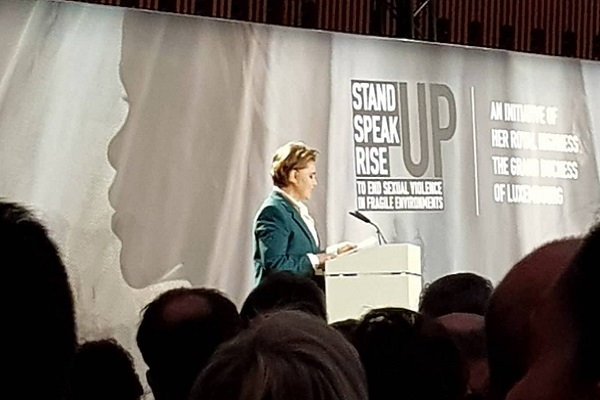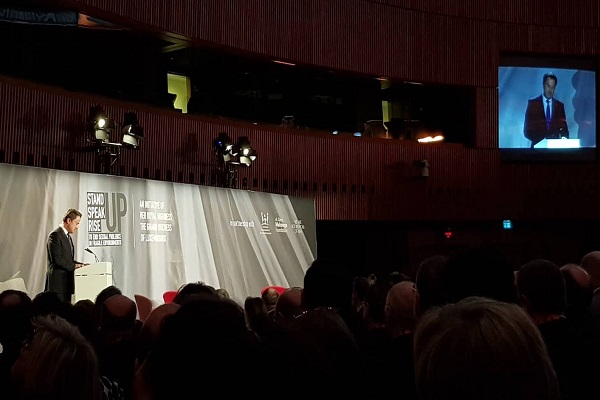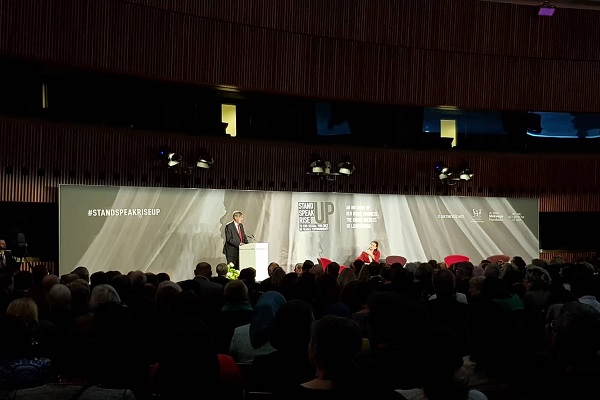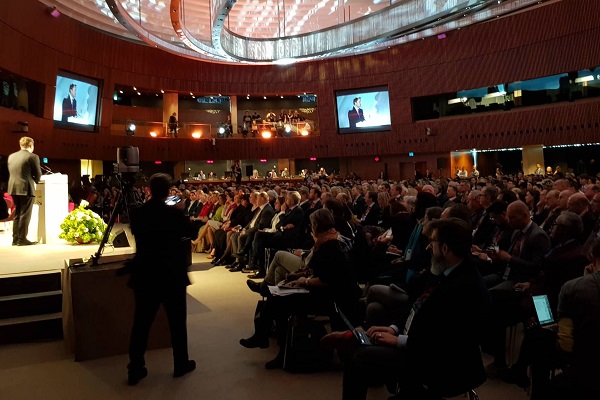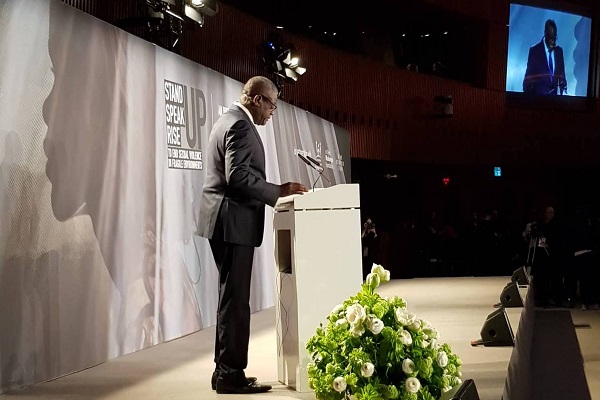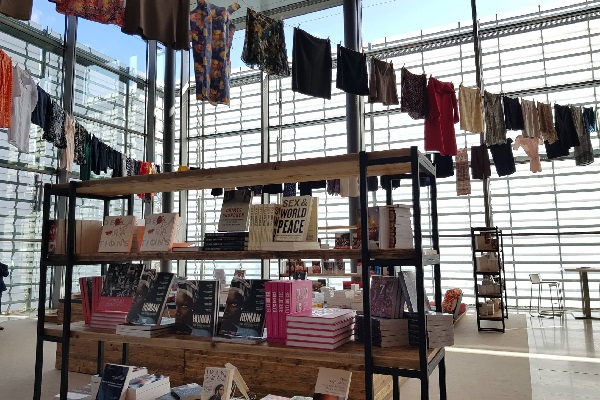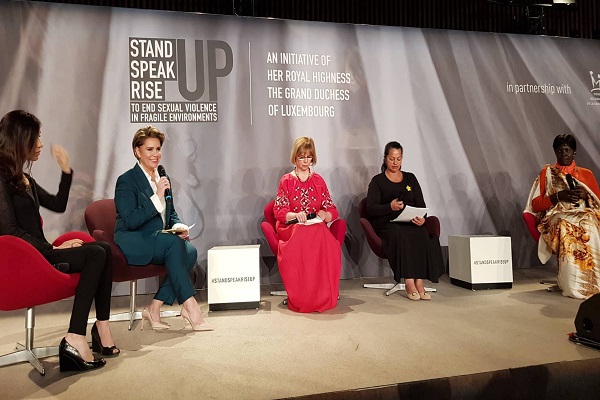 HRH the Grand Duchess of Luxembourg with survivors and political activists Iryna Dovhan, Fulvia Chunganá Medina, Aline Munezero and Nadia Murad;
Credit: Jazmin Campbell
HRH the Grand Duchess of Luxembourg with survivors and political activists Iryna Dovhan, Fulvia Chunganá Medina, Aline Munezero and Nadia Murad;
Credit: Jazmin Campbell
Tuesday afternoon marked the official opening of the two-day "Stand Speak Rise Up" conference, on the initiative of Her Royal Highness the Grand Duchess of Luxembourg.
Organised by the Foundation of The Grand Duke and The Grand Duchess in partnership with the Dr Denis Mukwege Foundation and the We Are Not Weapons of War (WWOW) non-profit start-up, the conference brought together several female survivors of sexual violence in fragile environments to the European Convention Center in Luxembourg. These inspirational women have told and will continue to tell their stories during this event, as well as continuing the fight against the use of rape (and other forms of sexual violence) as a weapon of war.
In her opening speech, HRH the Grand Duchess addressed the purpose of sexual violence in conflict zones, namely to terrorise and humiliate victims. In response, the Luxembourg monarch emphasised the importance of acting on this barbarity, this act of "making women the battlefield", and no longer closing our eyes to this long-term taboo. Reiterating one of the main mottos of the "Stand Speak Rise Up" initiative, the Grand Duchess concluded her bilingual speech (French and English) with a statement full of hope: "If we cannot end war, let us at least end rape as a weapon".
Prior to the first plenary session, the audience had the opportunity to watch an extract from the film "Woman" by Yann Arthus Bertrand and Anastasia Mikova. "Woman" features heartbreaking testimonies from survivors of sexual violence who want their stories to be heard. This was followed by a speech by Luxembourg Prime Minister Xavier Bettel, who praised the "Stand Speak Rise Up" initiative's efforts and emphasised the importance of collaboration in the fight against sexual violence, and a video message from Christine Lagarde, Managing Director of the International Monetary Fund (IMF), who similarly shared her support for the initiative. Lagarde highlighted the IMF's belief that providing legal protection against violence would help women succeed in the economic sector.
The first plenary of the event saw Professor François Heisbourg give a speech on the origins of sexual violence and the role of the geopolitical situation in fragile environments. He emphasised the use of geopolitics and new communication tools as a means to find and bring the perpetrators of these crimes to justice. In an exchange with WWOW President Céline Bardet, Professor Heisbourg similarly discussed the importance of technology, as well as emphasising that sexual violence resulting from war is not a new phenomenon.
Five survivors and activists in the field of sexual violence then took the stage for an exchange with the Grand Duchess and to share their stories of heartbreak, resilience and hope with the audience. These women, Iryna Dovhan (Ukraine), Fulvia Chunganá Medina (Colombia), Aline Munezero (Burundi), Nadia Murad (Iraq) and Ekhlas Khudhur Bajoo (Iraq), were some of many inspirational figures to have travelled from across the world to attend the two-day event. Most of them were forced to leave their home countries due to both their own experiences with sexual violence and their civic activism. All agreed in the importance of speaking out and sharing their stories and urged the international community to take greater action to bring perpetrators to justice for crimes of sexual violence against women in their countries and beyond. Each speaker confirmed her resilience and willingness to continue fighting in the hopes that one day there will be no more sexual violence as a weapon of war. To conclude on a hopeful note, Ekhlas Khudhur Bajoo stated that "Our smile and our humanity is the strongest weapon we have". Her brave words were met with a round of applause from the audience.
Special guest speaker Dr Denis Mukwege, a renowned Congolese gynaecological surgeon, founder of the international organisation of the same name and 2018 Nobel Peace Prize winner, then gave a keynote speech on his foundation, which supports victims of sexual violence around the world. Rather than blaming the victim, the Dr Denis Mukwege Foundation helps survivors medically, psychologically, legally and socio-economically. Dr Mukwege also put forward suggestions for the future prevention of such violence, namely educating children on "positive masculinity" and thus helping to "deconstruct toxic masculinity". He similarly emphasised the need for a global fund for reparations for victims of sexual violence in order to prevent stigmatisation. Indeed, he reiterated that "being silent is being an accomplice" and thus not an option. Dr Denis Mukwege's speech, as well as his answers in an exchange with Le Monde Special Correspondent Annick Cojean, earned him a standing ovation.
The first day ended with a series of workshops on different responses to sexual violence in fragile environments before a summary of the main conclusions of the event. Later this evening, there will also be a gala at the Philharmonie celebrating the victories of these survivors.

